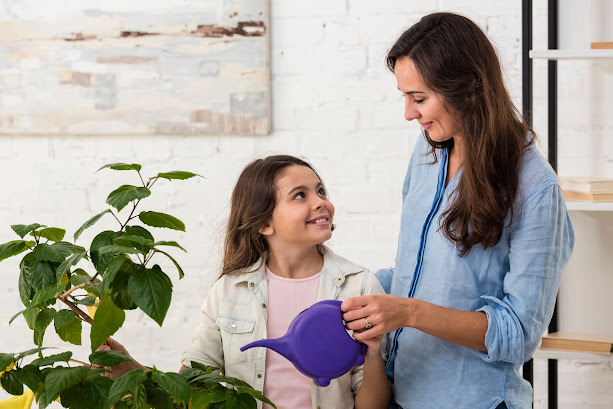How to Assist Preschoolers Cultivate Positive Behavior
We are all aware of how
important the first five years of a child's existence are, particularly when it
comes to instilling moral principles, polite behaviour, and excellent character
traits. Toddlers pick up new skills including attitude, communication, and habits,
and more surprisingly quickly. Instead of using punishment, a constructive
teaching strategy is needed to teach kids how to be kind, considerate, and
helpful. Let's look at some of the most useful and applicable methods that can
assist you in shaping your toddler into a decent person as they become older.
Leading Them by Example
The best way to teach toddlers or children about anything is to practice your teaching, especially in front of them. It’s proven as one of the most effective and easiest techniques for good parenting. Children are extremely observant of their parents. They pick most of their behavioural traits from the way their parents behave when in front of them. For example, a toddler that sees his father constantly failing to control his temper is bound to grow up to be a short-tempered child. Similarly, a toddler that sees his mother being helpful towards others all the time will grow up to be a considerate and helpful child. Some of the steps that you can take to ensure positive behaviour in your toddler are by leading by example.
Being courteous will not only help your toddler learn to be
polite, but it will also teach them manners like saying thank you and please.
Your child will learn to be courteous while speaking to both their teachers and
their friends if you speak to them kindly.
Praise: You might compliment your child on a nice deed or on how
well they handled a daily task. They will respond favorably to a simple compliment
such as "you did a really good job" or "you're really smart for
finishing your assignment all by yourself."
1. Proactive Listening: It is important to listen
to your little ones when they are speaking and respond positively to what they
wish to say. This will enable them to listen to you when you talk to them. This
is an easy way to develop positive listening skills in your toddler.
2. Sharing: Toddlers often love
sharing their thoughts, feelings, and their lives with their parents.
Similarly, share your own thoughts and feelings with them. Tell them what your
day was like, what you did at the office, or some or the other highlight from
your day. It’s not only limited to that but even your time, space, and
possessions. When
3. you share things with them,
material or otherwise, you indirectly teach the little one that sharing means
caring
Teaching
Positivity in a Negative Situation
It’s very normal for toddlers
to face situations that are bound to trigger a negative reaction. Situations
like being teased by an older sibling, being forced to share a toy/game, losing
the race to the front seat of the car, etc. are some of the most common
situations where toddlers react negatively. These situations may appear to be
simple and not worth your attention, but they can be very stressful for the
toddler. You can teach them to take things positively. Teach the little ones to
always look at the bright side. For instance, if they are unhappy because they
have to share their favourite toy, tell them that when they share their toys
with their friends, they are building a better relationship with them friends.
When they lose the race to the front seat of the car, telling them that the
rear seat is for bosses will lift their spirits up and help them start taking
things in a good way. Encouraging positivity at an early age is a good way to
help preschoolers deal with negativity when they grow older.
letting the young children handle
their issues
Oftentimes, when it
comes to their young children, parents are overly enthusiastic. When it comes
to homework and other assignments, we frequently strive to meet the requirements
of the kids before they even ask for it. It's vital to note that defending your
child is not always a smart option because it frequently weakens them and
renders them unable to figure out the issues on their own.
Conclusion
The majority of what Preschoolers learn comes from seeing the people around them. As long as they live
in a community where people uphold good values, exhibit proper manners and
etiquette, and are pleasant, their child will naturally learn excellent values,
manners, and fundamentally beneficial behaviour. Lessening the number of
directives and critical feedback promotes good thinking and behaviour among
family members. All of these methods aid in encouraging preschoolers to behave
well.


Comments
Post a Comment